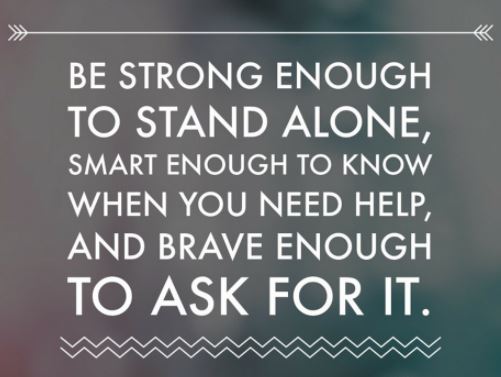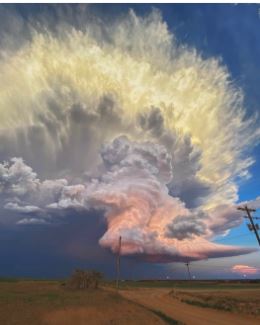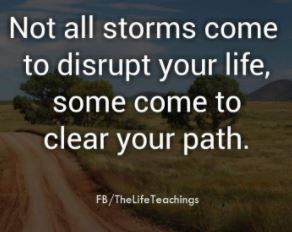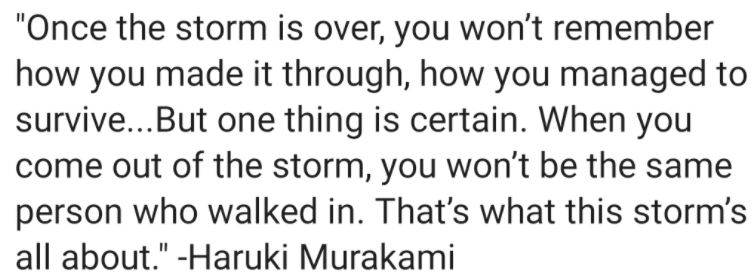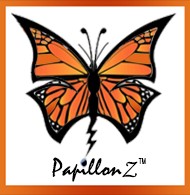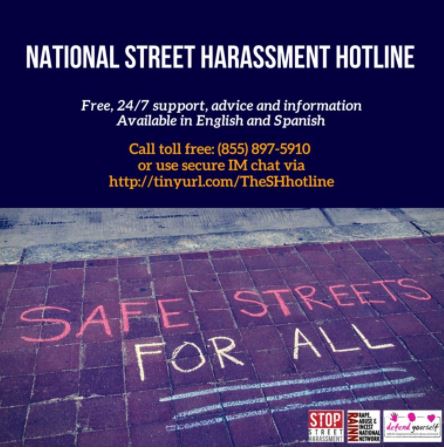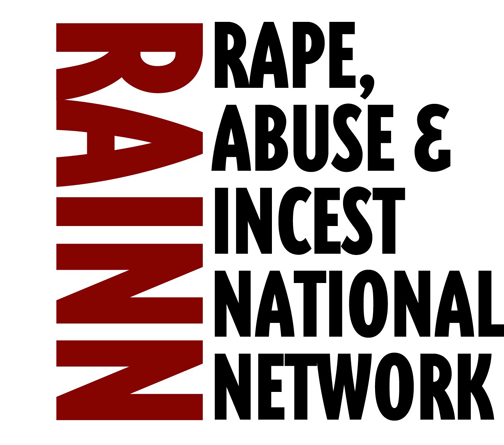Street Harassment
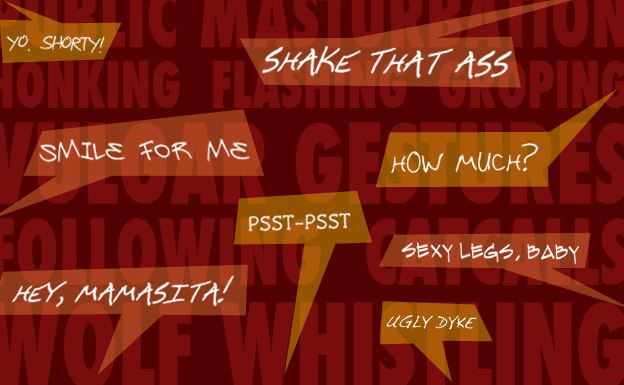
What is Street Harassment?
Street harassment is a form of harassment, primarily sexual harassment that consists of unwanted sexualised comments, provocative gestures, honking, wolf-whistlings, indecent exposures, stalking, persistent sexual advances, and touching by strangers, in public areas such as streets, shopping malls and public transportation.[1]
According to the non-profit organization Stop Street Harassment, street harassment is not limited to actions or comments that have a sexual connotation.[2]
Street harassment often includes homophobic and transphobic slurs, and hateful comments referencing race, religion, class, ethnicity and disability.[2]
The practice is rooted in power and control and is often a reflection of societal discrimination,[2] and has been argued to sometimes result from a lack of opportunities for expression of interest or affection (e.g. an inability to have social interaction).
Recipients include people of all genders, but women are much more commonly victims of harassment by men. According to Harvard Law Review (1993), street harassment is considered harassment done primarily by male strangers to females in public places.[3]
According to the founder of Stop Street Harassment, it can range from physically harmless behavior, such as “kissing noises” and “non-sexually explicit comments”, to “more threatening behavior” like stalking, flashing, sexual assault, and rape.[4]
Taking photos of strangers without permission, as street photography and photojournalism practitioners do, is not considered street harassment.[5]
Source: Wikipedia Click Here to Read More: Street harassment – Wikipedia
National Street Harassment
HOTLINE: 1-855-897-5910 and IM Chat
(English and Spanish, 24/7)
What Is Street Harassment? | Stop Street Harassment
http://tinyurl.com/TheSHhotline
Created by Stop Street Harassment, Defend Yourself, and operated by RAINN, the National Street Harassment Hotline is a resource for those affected by gender-based street harassment.
Support is available in English and Spanish: call 855.897.5910 or chat online.
Call toll-free: 1-855-897-5910
Visit the online hotline to receive help over secure, anonymous IM chat. It is compatible with smartphones, tablets, computers and other internet-enabled devices (English | Spanish) Help is available 24/7.
From Defend Yourself and National Street Harassment Hotline | Stop Street Harassment
ABOUT THE HOTLINE
“With Defend Yourself and Rape, Abuse & Incest National Network (RAINN), in July 2016 we launched a gender-based street harassment national hotline.
“RAINN operates the National Sexual Assault Hotline, which provides confidential support those impacted by sexual violence in both Spanish and English. The hotline is available via online chat and by phone 24/7. SSH and Defend Yourself trained RAINN staff who answer the National Street Harassment Hotline.
“We are thrilled about this new partnership and the ability to provide a safe space for those impacted by street harassment to receive help and appropriate resources,” said RAINN’s vice president for victim services, Jennifer Marsh.
“Gender-based street harassment affects at least 65% of women and 25% of men in the USA, and it starts at a young age. It can range from catcalls and unwanted sexualized and homophobic comments to illegal acts like following, flashing, groping and sexual assault.
“Until now, there has not been a go-to place for people facing gender-based street harassment to find help. They want to know things like how to respond if they’re harassed, what their rights are under the law, or to generally receive emotional support,” said Holly Kearl, founder of SSH. “SSH is so pleased to be partnering with these two organizations to create that system of support.”
“A growing body of research shows that street harassment negatively impacts women emotionally. It can be traumatic for them, especially for survivors of sexual abuse. “Mild” street harassment can escalate into physical harassment without warning and many women and some men have an underlying fear that verbal harassment will become physical. In January 2016, there were two cases – in Texas and Pennsylvania – of street harassment escalating into murder. In late March 2016, a mother in California was shot in the stomach by street harassers whom she confronted for harassing her teenage daughter.”
“Street harassment is probably the No. 1 problem that brings women and teen girls to our classes,” says Lauren R. Taylor, director of Defend Yourself. “They desperately need alternatives to ignoring it. With this hotline, we can empower people by sharing skills – and increasing options – for dealing with harassment in public spaces.”
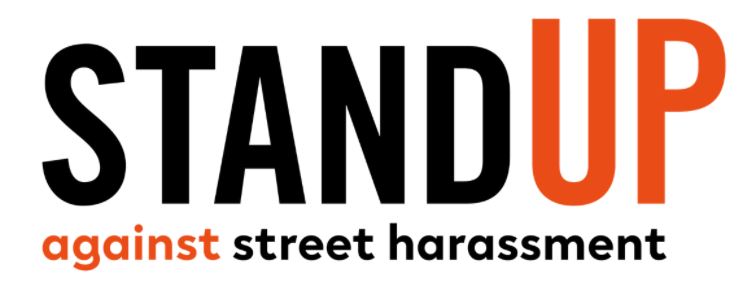
What does the Name “Stand Up Against Street Harassment” mean?
We wanted a name that inspired people to take action by standing up for each other. We want to be clear though — you don’t need to physically stand up to intervene or otherwise respond to harassment. Our methodology offers concrete ways that people can “stand up” regardless of their ability.
Source: Bystander Intervention Training: Stand Up Street Harassment | Hollaback (ihollaback.org)
What is Street Harassment and Who is Most Impacted?
Street harassment is sexual, gender-based, and bias-motivated harassment that takes place in public spaces like the street, the supermarket, and the social media we use every day. At its core is a power dynamic that constantly reminds historically subordinated groups of our vulnerability to assault in public spaces. Street harassment can happen to anyone, but disproportionately punishes women, girls, LGBTQ+ people, and other marginalized groups for being themselves in the world.
Street harassment is on a spectrum of gender-based violence. At one end of the spectrum, we have examples like inappropriate gestures, staring, whistling, following, and comments about your appearance or identity. As we move along the spectrum we start to see more severe forms of street harassment like public exposure and groping that are illegal. We include these behaviors in how we define street harassment because they are so common, pervasive, and rarely reported to authorities.
Street harassment is not about sexual gratification. It’s about power. If street harassment were about getting dates, it would be what author Marty Langelan calls a “spectacularly unsuccessful strategy.” Instead, street harassment is about “putting people in their place.”
At Hollaback!, we believe that what specifically counts as street harassment is determined by those who experience it. If you feel like you have been harassed, we believe you, we support you, and we invite you to share your story.
Source: Bystander Intervention Training: Stand Up Street Harassment | Hollaback (ihollaback.org)
How should I respond to Street Harassment?
Remember that it’s not your fault. And because it’s not your fault, it’s also not your responsibility to have the perfect response to street harassment. It’s their responsibility not to harass you.
While everyone is vulnerable to street harassment, research suggests that people who are aware of their surroundings, walk with confidence, and respond confidently to harassment are less vulnerable. Nevertheless, direct confrontations with people who harass can escalate, particularly if you are alone or in an unpopulated space. While it is each individual’s right to decide when, how, and whether to respond to street harassment, it’s important to prioritize your safety and wellbeing. To learn more about how to respond to harassment, check out the training on the Stand Up Against Street Harassment website.
If you want support, we’ve got your back. Read on to find out how to report harassment on Hollaback!’s website or via the app. If you’re thinking bigger picture, you can take action here and even start a Hollaback! site in your community.
Why Street Harassment Matters
Street harassment is an experience that devalues people of all sexual orientations, cultures and beliefs causing them to doubt their own experiences. When we watch harassment happen without intervening, it deepens the trauma for the person being harassed and shows the person doing the harassing that their behavior is OK. We want to disrupt this dynamic one intervention at a time.
When we see someone fall, or drop something in public, we instinctively help out. Why don’t we have the same reaction when we see someone being sexually harassed? We see it happen, but uncomfortably look away. We feel the urge to speak up, but stay cautiously silent. We all want to do something about it, but don’t know what. Or worse, we end up thinking it’s “not a big deal.” Not knowing what constitutes street harassment and what to do, limits our ability to take action, chipping away at the self-worth of men and women who suffer from street harassment.
Responding as a Bystander
All across the United States, girls, women, and transgender and gender non-binary individuals experience street harassment simply because of their gender identity or gender expression.
We all have a responsibility to do something when we see street harassment happening, but too often we freeze. We don’t know what to do. Bystander intervention gives us tools to intervene without compromising our own safety.
When we intervene, we don’t just reduce trauma for the person being street harassed. We also start to chip away at the culture that allows harassment to be so prevalent.
What’s worse than being targeted with harassment because of your race, sex, religion, color, gender, size, orientation, disability, age, or origin? Being targeted while surrounded by bystanders who see what is happening, but then do nothing.
How do you solve the problem of Street Harassment?
We believe that bystander intervention is a key intervention because it puts power in the hands of community members. We do not strategies that further criminalize harassment because we believe that the root street harassment is bias — not “a few bad apples.”
Historically we’ve seen that criminal law and punishment are disproportionately applied to people of color, low-income individuals, and trans and gender-nonconforming people. As advocates, we steer policymakers away from measures that would increase criminalization that predominantly affects these groups, and toward measures that engage communities in prevention. Replacing sexist oppression with racist oppression is not a proper hollaback. As we explained in a 2013 Huffington Post article:
Criminalizing verbal harassment and unwanted gestures is neither the final goal nor the ultimate solution to this problem and can, in fact, inadvertently work against the growth of an inclusive anti-harassment movement. The criminal justice system disproportionately targets and affects low-income communities and communities of color, as evidenced by policies such as New York City’s Stop and Frisk program and other degrading forms of racial profiling. Our objective is to address and shift cultural and social dialogues and attitudes of patriarchy that purport street harassment as simply the price you pay for being a woman or being LGBTQ. It is not to re-victimize men already discriminated against by the system.
We recommend policy solutions that expand bystander intervention education, improve research and reporting mechanisms, train police and transit officers, engage local businesses, and bring together diverse community members to facilitate “community safety audits.”
Source: Bystander Intervention Training: Stand Up Street Harassment | Hollaback (ihollaback.org)
At this moment in history, we are witnessing a spike in disrespect, harassment, and hate violence. As bystanders, we need to be especially vigilant and aware of what disrespect, harassment, and hate violence look like in order to be able to stand up and intervene at a time when people need it most.
You can make a choice to actively and visibly take a stand against harassment. The Five D’s are different methods you can use to support someone who’s being harassed, emphasize that harassment is not okay, and demonstrate to people in your life that they too have the power to make our communities and workplaces safer.
WHAT ARE HOLLABACK!’S 5D’S?
Hollaback!’s 5D’s are:
Distract, Delegate, Document, Delay, and Direct.
Hollaback! has been working on the issue of street harassment for 15 years, since 2005. We are a global leader in the movement to end harassment and strong advocates for an intersectional approach to addressing harassment. What started as a blog launched by youth to share personal experiences of harassment quickly turned into a global initiative.
How to Share Your Story of Harassment
Sharing your story of harassment is a powerful way to show others that street harassment is a problem. On a personal level, it can also help facilitate healing.
Here are three simple ways to do it:
- Download our free apps for iPhone and Android.
- Submit your story right here, on our website: ihollaback.org.
- Text your story to holla@ihollaback.org (put the email address where the numbers usually go) and we’ll receive it via email. You can even send a picture or the location of your harassment so we can map it.
Please note our anti-discrimination policy: We will not fight street harassment at the expense of oppressed people, and part of that is omitting irrelevant details about harassers’ race. We will not accept submissions that play up stereotypes based in racism. Same for classism, homophobia, transphobia, ableism, and the usage of any other identity signifier. Harassment comes from people in every facet of our cultures and every stratum of society. We ask that you refrain from referencing the attributes of your harasser, because this movement is about changing societal values, not pointing fingers. If you feel those details are important to your story, please make sure their relevance is explained clearly and constructively in your post.
Hollaback! works in communities to understand the problem, ignite public conversations, and develop innovative strategies that result in safe and welcoming environments for all.
We’re honored to be able to bring this work to scale in partnership with L’Oreal Paris through the Stand Up Against Street Harassment campaign.
Training is available!!
Learn more at Hollaback! Free Bystander Intervention Training (ihollaback.org)
Bystander Intervention Training: Stand Up Street Harassment | Hollaback (ihollaback.org);
Bystander Intervention Resources | Hollaback! End Harassment (ihollaback.org)
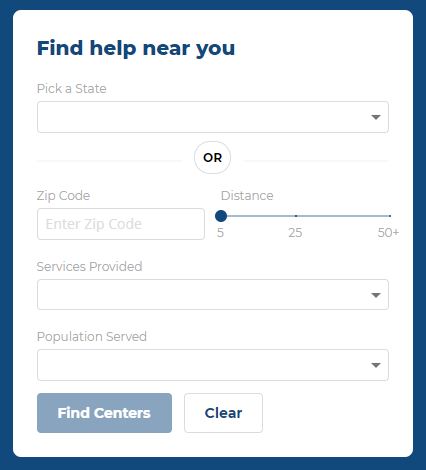
( centers.rainn.org )
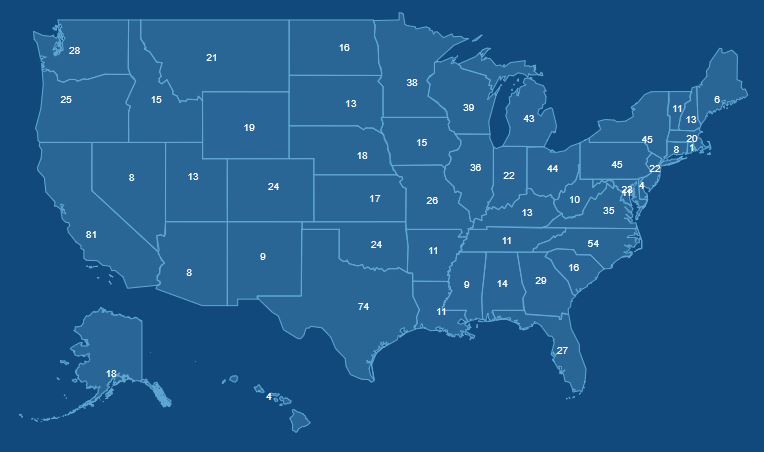
It’s helpful to have support in your own community after a sexual assault. Local service providers make it easy for you to access care, and they are knowledgeable about the laws in your area and local resources that can assist you.
RAPE, ABUSE AND INCEST NATIONAL NETWORK
HOTLINE: 1-800-656-HOPE (4673)
Click for article: Street Harassment | RAINN
ADVOCATES AND SHELTERS (Local Programs) listed by State, organized by County:
https://www.womenslaw.org/find-help/advocates-and-shelters
For a list and description of organizations that provide assistance for survivors and their families, visit: https://www.rainn.org/national-resources-sexual-assault-survivors-and-their-loved-ones
- Asian, Native Hawaiian and Pacific Islander Survivors
- Black Survivors
- Child Abuse/Sexual Abuse
- College Students
- Domestic, Dating and Intimate Partner Violence
- Human Trafficking
- Immigrant Survivors
- Incest
- Indigenous Survivors
- Latinx Survivors
- Legal Resources
LGBTQ Survivors
LGBTQ Survivors of Color
Male Survivors
Medical/Physical Health
Mental Health
Military Resources
Stalking
Sexual Assault Prevention
Suicide & Self-Harm
Survivors with Disabilities
“The RAINN app gives survivors of sexual violence and their loved ones access to support, self-care tools, and information to help manage the short- and long-term effects of sexual violence.
Find Support
“The app’s “Hotline” feature can connect you directly with one-on-one support from a trained support specialist on RAINN’s National Sexual Assault Hotline via phone or online chat. It’s free, confidential and available 24/7.
“You can also chat with other survivors in our peer-to-peer HelpRoom.”
Practice Self-Care
“The app’s “Self-Care” section contains exercises to help you take a moment for yourself as you heal. They include a Mood Tracker to help you reflect on how you’re feeling and figure out the best ways to care for yourself; relaxing visuals from The Monday Campaign to help you destress; and audio exercises from Headspace for calming meditation.”
Learn More
“The app’s “Learn” section includes helpful information on sexual violence topics, finding and giving support, and healing.
“You can also hear from survivors offering their own real-life stories of hope and healing.”
The RAINN app is available in the App Store and on Google Play. Download it today.
STUDENT SAFETY
https://www.rainn.org/safety-students
Safety & Prevention
https://www.rainn.org/safety-prevention
Safety for Parents
Safety for Students
Warning Signs
Protecting Others
Online Safety
Safe Web Browsing
Social Media Safety
Staying Safe
What Consent Looks Like
How to Respond if Someone is Pressuring You
Safety Planning
Safety Tips for Traveling
Alcohol Safety
Let’s Talk About…for all ages
Staying Safe on Campus
https://www.rainn.org/articles/staying-safe-campus
Alcohol Safety
https://www.rainn.org/articles/alcohol-safety
Steps You Can Take to Prevent Sexual Assault
https://www.rainn.org/articles/steps-you-can-take-prevent-sexual-assault
Your Role In Preventing Sexual Assault (Bystander)
https://www.rainn.org/articles/your-role-preventing-sexual-assault
What Consent Looks Like
https://www.rainn.org/articles/what-is-consent
How to Help Someone You Care About – Tips from RAINN
https://www.rainn.org/sites/default/files/HelpSomeoneOnePageRAINN.pdf
SelfCare After Trauma – Tips from RAINN
https://www.rainn.org/sites/default/files/SelfCareOnePageRAINN.pdf
Online Dating and Dating App Safety Tips
https://www.rainn.org/online-dating-and-dating-app-safety-tips#overlay-context=
#RAINNDAY & #LetsGetLoud “Need some social media inspiration? Try pairing a few of the posts with our RAINN Day graphics below.
“Browse the #RAINNDay and #LetsGetLoud hashtags on Instagram to see how students around the country are raising awareness for Sexual Assault Awareness and Prevention Month.
#LetsGetLoud & speak out about sexual assault during #RAINNDay. Make a difference: rainn.org/rainnday
#LetsGetLoud so survivors know that they are not alone. I’m making a difference on my campus with #RAINNDay on 4/14. You can too: rainn.org/rainnday
#LetsGetLoud so survivors know that they are believed and sexual violence is not tolerated on our campus. Learn how you can help at rainn.org/rainnday
#LetsGetLoud about protecting each other. I’m bringing my campus together on #RAINNDay to help end sexual assault. rainn.org/rainnday As a college-age person, we are at a high risk for sexual violence. #LetsGetLoud and stop sexual assault on college campuses. Find out how at #RAINNDay. rainn.org/rainnday
SPREAD THE WORD ON SOCIAL MEDIA!!
“You can play an important role in stopping sexual violence and connecting survivors with the support they deserve. The best part? You only have to lift a finger. Acting with RAINN on social media gives you a chance to have a voice in the conversation about sexual violence.
Share the messages below on social media:
Connect survivors with help: The National Sexual Assault Hotline provides free, 24/7 support to survivors of sexual assault and their loved ones. Reach those who need this valuable service by sharing the hotline information on social media.
If you have been affected by sexual assault, you are not alone. @RAINN provides free, confidential support 24/7 at online.rainn.org.
@RAINN provides free, 24/7 support for survivors of sexual assault and their loved ones at 800.656.HOPE and online.rainn.org.
Sexual assault is never your fault. @RAINN now offers free, confidential Spanish support services online 24/7 at rainn.org/es.
Educate your friends: Debunk myths and educate your network about sexual violence. Share a statistic to shed light on the issue. Every 73 seconds, another American is sexually assaulted. Learn more and take action with @rainn at rainn.org. 98% of rapists will never spend a day in jail. Help bring rapists to justice with @rainn at rainn.org.
Advocate for survivors of sexual violence: Use your voice to create a ripple effect of change for survivors among your peers, in your community, or even on Capitol Hill.
Raise awareness and educate students about sexual assault resources from @RAINN with #RAINNDay! Learn more at rainn.org/rainnday.
Support funding to help victims of sexual violence and hold perpetrators accountable. rainn.org/action-center @rainn #ActWithRAINN.”
 Public Policy and Action – Interactive Map – Laws of Your State
Public Policy and Action – Interactive Map – Laws of Your State
RAINN Needs Your Voice
Countless survivors’ kits are languishing on shelves in evidence rooms and labs across the U.S. Even today, some survivors must wait nearly a decade to get their kits processed and tested. Right now, approximately 200,000 kits wait to be tested. Today, we have a chance to make a difference.
The U.S. Senate is currently deciding how much to spend on the backlog and your voice can be the difference between more funding or less.
Stand With Survivors and Ask Your Senators to End the Backlog. Justice Delayed is justice denied. Urge your senators to do their part to help end the rape kit backlog today.
Send email = https://p2a.co/1jqx2dk?p2asource=FY21_BacklogAlert_email1_all
How RAINN’s Policy Team Works Help Survivors https://www.rainn.org/news/how-rainns-policy-team-works-help-survivors
“Recently, as Congress has considered police reform legislation, RAINN has urged House and Senate leaders to include a number of additional changes to help survivors of sexual violence. RAINN’s suggestions address issues that disproportionately impact Black victims of sexual violence, especially Black girls, who are overrepresented in juvenile justice data. According to The Sex Abuse to Prison Pipeline: The Girls Story, 76 percent of girls involved with the justice system have histories of physical and sexual abuse.”
Additional Resources
- Advocates and Shelters | WomensLaw.org (drop-down menu for your State)
- Click here to enter your zip code: Find Domestic Violence and Abuse Help, Information and Stats (domesticshelters.org)
Domestic Violence Support | The National Domestic Violence Hotline (thehotline.org)
- National Organizations | WomensLaw.org (listed by subject matter)
- Chat Rooms and Message Boards | WomensLaw.org
- VictimConnect (serves victims of crime in US (including assault, abuse, domestic violence, teen dating violence, trafficking, stalking, etc.), and make local referrals.
Mental Health Resources
